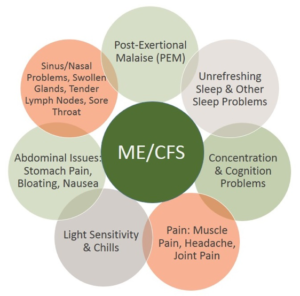Myalgic encephalomyelitis (ME), more commonly referred to as Chronic Fatigue Syndrome (CFS), is a debilitating disorder characterized by extreme fatigue or tiredness that doesn’t go away with rest and, currently, can’t be explained by an underlying medical condition.
The cause of chronic fatigue syndrome is unknown, although there are many theories – ranging from viral infections to psychological stress. Some experts believe chronic fatigue syndrome might be triggered by a combination of factors.
There’s no single test to confirm a diagnosis of chronic fatigue syndrome. You may need a variety of medical tests to rule out other health problems that have similar symptoms. Treatment for chronic fatigue syndrome focuses on symptom relief. (MayoClinic.org)
Epstein Barr Virus and CFS
Although CFS is thought to be a result of chronic infectious disease, Epstein Barr Virus (EBV) has been excluded as a cause of CFS, even though EBV infection is one of the many causes that may lead to a state of chronic fatigue. CFS is not synonymous with chronic EBV infection or chronic infectious mononucleosis. (MedScape.com)
Other symptoms of CFS may include:
- Extreme exhaustion
- Non-restorative sleep
- Brain fog/cognitive impairment
- Joint pain
- Inflamed lymph nodes
- Persistent sore throat
- Severe headache
- Neurological abnormalities
- Complete organ system shutdown
- Sensitivity to light, sound, odors, chemicals, foods, and medications
- Irritability, depression, and mood swings (org)
The main symptom is persistent fatigue for more than six months. The fatigue often worsens with activity, but doesn’t improve with rest.
CFS Risk Factors
Factors that may increase your risk of chronic fatigue syndrome include:
- Age – Chronic fatigue syndrome can occur at any age, but it most commonly affects people in their 40s and 50s.
- Sex – Women are diagnosed with chronic fatigue syndrome much more often than men, but it may be that women are simply more likely to report their symptoms to a doctor.
- Stress – Difficulty managing stress may contribute to the development of chronic fatigue syndrome.
Treatments include graded exercise therapy and cognitive behavioral therapy. Other medications or therapies may provide symptom relief.


